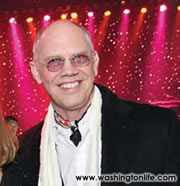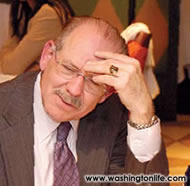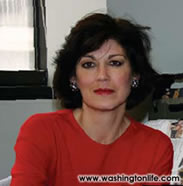Who's in & Who's Out?
Chaffee, Conconi and roberts come out firing
about social power and social players
Like the cycle of the seasons, job titles
change, invitation lists follow suit, and
Washington society turns over a new
leaf. No one knows this better than the
Washington Times' social editor, Kevin Chaffee;
The Washington Post's "Reliable Source"
columnist, Roxanne Roberts; and veteran gossip
columnist turned public affairs counsellor Chuck
Conconi. The trio has been covering the social
landscape of Washington for a collective 40-plus
years. At a recent Washington Life zeitgeist, they
dished about the White House, Georgetown
and Embassy Row with a focus on old and new
players on the Washington scene.
On Social Power
Roxanne Roberts: In the simplest terms, social
power is the ability to draw people as you desire.
The primary and most important examples are the
President and the First Lady. If they issue an invitation
almost anybody would respond if they can.
Kevin Chaffee: It's considered to be a command.
RR : The question is not only who has social
power, but what they use social power for. Is it just
because they enjoy socializing and enjoy giving
parties? Or do they have a motive beyond that?
Are they trying to achieve a business objective, a
financial objective, or an ego objective?
Chuck Conconi: A lot of it is social
gratification, but in Washington in particular,
people play it very well for political reasons,
fund raising, etc. If you have social power of
that kind, you become influential and your
influence grows because you are perceived as
someone who has power. Juleanna Glover Weiss
is a good example of someone, who, because of
the vacuum in this republican administration,
has developed a social power of her own.
KC: Back in the old days it was different to a large
extent. Alice Roosevelt Longworth, invited people
because it amused her to see sworn enemies sit across
from each other. Marjorie Merriweather Post had
hundreds of millions of dollars and she entertained
herself by letting others have a good time. Nowadays
that's very rare.
RR : Most people in Washington are very careful
because they have to answer to someone else-
either a boss or a constituent. The ability to do
things just because they may be fun or amusing
is not the primary reason people entertain or use
there influence here.
On Ambassadors
CC : I don't like talking about ambassadors and
embassies because I find them generally boring and
their parties not very good. Frankly, they forget to
clean their lists and there are a lot of people on there
who you don't need to know or see anymore.
KC: Their invitation lists came from their social
secretaries and the previous ambassador which go
back 25 years.
CC : That's right, and you usually go around
saying ‘I thought they died years ago!'
On Money
KC: There are plenty of multi-millionaires
and billionaires who have no social power
because they don't use their money to have
fun or further any cause. Other people maybe
don't have all that much money, yet are very
prominent hosts and hostesses with clout.
CC : Power in Washington is money of course-money is power everywhere, but it's also the political
power. That's what Washington is mostly about. It's
the lobbying power; it's the people who have issues
here who work through the big lobbying agencies.
RR : If you are a defense contractor and you want
to get a government contract, being part of the
Washington social scene may not help you. If you
have enough money you can go directly into a
congressional office and lobby there.
CC : Of course. But who would pay attention to
Jim Kimsey if he hadn't put $10 million into the
Kennedy Center and got named to the board?
KC: Or Catherine Reynolds, who gave $100 million.
The new Katharine Graham
KC: There are no new Katharine Grahams.
They are gone.
RR : Mrs. Graham was unique.
KC: Rima Al-Sabah does a fabulous job. Rima
treats every event that she does, and she entertains
frequently, as a personal extravaganza. She makes
everyone feel like they are the center of the
universe. She creates excitement and ends up
getting a lot of people there with a combination of
charm and persuasion, but it isn't like the old days
where you could simply send out an invitation
and people would just show up.
RR : The fact is that you can turn down a dinner.
But I think that what is missing now is the sort of "salon" that Pamela Harriman used to host.
KC: Anyone who tries to do that, or much less
tries to call it a salon, is going to be ridiculed. But
Katharine Graham could invite any head of state-
nobody else could do that. I think the hallmark
of a major happening is when somebody flies in
to Washington D.C. from farther than two hours
away to come to a certain event. That says a lot.
RR : Lily Safra has enough money that if she has an
event people will fly in for it.
KC: Catherine Reynolds entertains for her
husband's Road Map to Achievement thing. The
new Saudi ambassador, Prince Turki al-Faisal
may turn into a major social presence because
his wife is not wearing a veil and hidden away
somewhere. She's in mixed company, which
[Prince] Bandar's wife was not. He's known for
being a great party guy, a great host. Maybe they
will emerge as major social players.
On Social Institutions
WL : What are the power social institutions?
RR : The Kennedy Center and the Library of Congress.
CC : The Opera, the Symphony.
KC: In a quieter way, but very high level, the
Folger and the Phillips. The Ballet is emerging
from its doldrums.
CC : The National Gallery of Art is the one
party venue where you see the most incredible
mix-from New York, Los Angeles, Europe,
and Washington.
RR : In some ways you are safer aligning yourself with
an institution than with a political entity because the
political power shifts back and forth. You might be on
an "A" list one year and five years later no one wants
you to come to dinner.
On Journalists
CC : The journalists/political group is a different
crowd. It's best to go to their parties before and
after, and avoid the dinner if you possibly can. In
many ways those are purely working events.
KC: Like at the White House Correspondents'
Dinner-there are just too many younger reporters
who are all getting drunk.
CC : It's still an age where people would kill to
go to that. And of course there is the Bloomberg
party afterwards.
KC: Can we talk about the journalists on the
social scene? That's a real phenomenon because
in the old days they were never invited. No one
wanted them around.
CC : 40 to 50 years ago when journalists were
really considered trash-most of them were
uneducated drunks.
KC: Journalists are so socially accepted now
because many of them have something going with
the people they cover and they're not going to
report on them the hard way.
CC : The turning point on the social value of
journalists was around the time of Woodward and
Bernstein. They also made journalists acceptable and
glamorous. There are a lot of journalists in this town,
who when they walk into a room people really get
excited. I walked through Martin's in Georgetown
one night and people came out of the woodwork
to meet Tony Kornheiser.
RR: Tim Russert.
CC: It's hard for me to believe it, but Chris Mathews.
KC: Chris Buckley, George Stephanopoulos, Sam
Donaldson-the list goes on and on.
On The Hill
KC: These big Hollywood stars come here-
people who have entourages and security
armies and only fly in private jets-and this is
the one place where they are in awe because
they meet Bill Clinton or Donald Rumsfeld. It
really impresses them.
RR : The idea that the Speaker of the House
would walk into the room and people would
basically freeze, doesn't exist anymore because
this particular Speaker chooses not to go out
very much.
CC : It reflects the White House and [people
in the Administration] who don't want to look
frivolous.
KC: And when they do go out there is no
fashion to speak of because they do not want
to look frivolous.
RR : I harken back to 1994 when Newt Gingrich
basically felt that engaging with Washington was
a form of dancing with the enemy.
CC : If you spent most of your time running
against Washington, as so many of the political
figures do, you don't want to be seen back home
as enjoying Washington.
On Established Washington vs.
the New Kids
RR : The Washington es tabl i shment
completely ignored and looked down on
a lot of the high-tech kids, the Northern
Virginia crowd-they wouldn't have anything
to do with them until they got so rich that
they couldn't afford to ignore them anymore
because they wanted their money.
KC: Old money is largely considered irrelevant
now. Breeding and four generations of wealth
used to count for something.
WL : The new money techies are giving to
very different organizations. They're involved
with the mentor ing programs and local
grassroots organizations. For them that's
real power, and people like Jack Davies, Joe
Roberts, Jim Kimsey and Raul Fernandez
have made these less traditional causes and
organizations very desirable.
KC: It's tough because no matter how
much money the newcomers have there are
still people who are ahead on them on the
ladder. Remember that story about Cornelia
Guest who was asked why she wasn't getting
involved in more charities down in Palm
Beach? she said, "I can't. The good diseases
are all taken."
|



